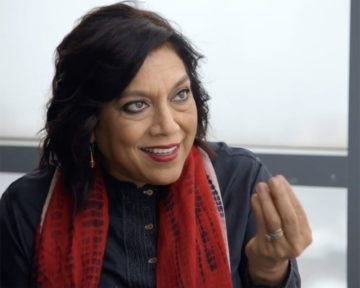Isaac Chotiner in The New Yorker:
 This month marks the American release of the director Mira Nair’s six-part television adaptation of “A Suitable Boy,” Vikram Seth’s beloved, kaleidoscopic novel of early post-Partition India, from 1993. (It began streaming on Acorn TV on December 7th.) The book, which, at more than thirteen hundred pages, is longer than “War and Peace,” tells the story of a young woman, Lata, and her search for a husband, while also featuring a remarkable cast of characters, largely from four interwoven families. The novel also touches on land reform, cricket, and religious tension, in playful, inventive language and sometimes with laugh-out-loud humor. Seth reportedly has been working on a sequel for more than a decade, the rumors of which have thrilled his fans.
This month marks the American release of the director Mira Nair’s six-part television adaptation of “A Suitable Boy,” Vikram Seth’s beloved, kaleidoscopic novel of early post-Partition India, from 1993. (It began streaming on Acorn TV on December 7th.) The book, which, at more than thirteen hundred pages, is longer than “War and Peace,” tells the story of a young woman, Lata, and her search for a husband, while also featuring a remarkable cast of characters, largely from four interwoven families. The novel also touches on land reform, cricket, and religious tension, in playful, inventive language and sometimes with laugh-out-loud humor. Seth reportedly has been working on a sequel for more than a decade, the rumors of which have thrilled his fans.
Nair, who was born in 1957 in the Indian state of Odisha (then called Orissa), and has been based in New York for about four decades, was an obvious choice for the adaptation. In 1988, she directed “Salaam Bombay!,” a critically acclaimed account of life in the slums of Mumbai. She followed it up with an early Denzel Washington drama, “Mississippi Masala,” about an Indian from Uganda in the American South. Since then, Nair has made ten feature films, including “Monsoon Wedding,” from 2001, and has become known as one of the preëminent interpreters of the Indian-immigrant experience. Nair has also adapted classic novels, including “Vanity Fair,” and several pieces of modern literature, such as Jhumpa Lahiri’s “The Namesake” and Mohsin Hamid’s “The Reluctant Fundamentalist.” In a Profile of Nair, in 2002, John Lahr wrote, “Nair’s films negotiate disparate ethnic geographies with the same kind of sly civility she practices in life. Her approach is sometimes oblique: she doesn’t make political films, but she does make her films politically. Her gift, to which ‘Monsoon Wedding’ attests, is to make diversity irresistible.”
Nair and I recently spoke over Zoom, while she was completing work on the last episode of the series. During our conversation, which has been edited for length and clarity, we discussed her career as a filmmaker, the challenges of adapting an epic novel, and how rising intolerance in India, led by the Hindu-nationalist Bharatiya Janata Party, affected her work on “A Suitable Boy.” After our interview, it was reported that members of the B.J.P. called for an investigation of Netflix, the series’ Indian distributor, claiming that the depiction of a kiss between a Muslim man and Hindu woman intentionally affronts religious sentiments, which in India is a criminal offense. Netflix has made no public comment, and Nair declined to address the complaint.
More here.
